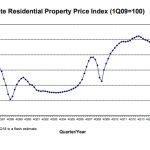The sale and lease of residential properties are exempted from real estate GST, but there are exemptions.
By: Hitesh Khan/
The sale and lease of properties in Singapore are subject to Goods and Services Tax (GST) except for residential properties. Real estate GST is also chargeable on the supply of movable furniture and fittings in both residential and non-residential properties.
Charging GST on Real Estate
The sale and lease of residential properties are exempted from GST (i.e. GST need not be charged), but the sale and lease of non-residential properties are subject to GST. For properties that consist of both residential and non-residential portions, only the non-residential portion is subject to real estate GST.
Furnished Residential Properties
 When the residential properties are furnished, real estate GST is charged on the supply of movable furniture and fittings.
When the residential properties are furnished, real estate GST is charged on the supply of movable furniture and fittings.
However, fixtures such as built-in cabinets and wardrobes, kitchen and sanitary wares, wall-mounted air conditioners that are attached permanently to the residential property can be exempted from GST together with the property.
Residential vs. Non-Residential Property
As different GST treatment applies to residential and non-residential property, you need to identify if your property is residential or non-residential.
Residential Properties
Residential properties refer to vacant residential land, and residential building, flat, or tenement (referred to as ‘building’).
Land
It is considered as residential land if it is a vacant land zoned ‘Residential’ in the Master Plan and the use of the land is approved for residential or condominium development.
Residential land includes vacant land or land with existing building (which is required by the Government or public authority to be demolished) which is supplied by the Government or public authority and approved exclusively for residential or condominium development.
Building
A building is a residential building if it is approved for use or approved to be used for residential purposes. Please refer to the approved use of the building that is granted by the relevant authorities during the relevant period in which the supply occur.
https://www.icompareloan.com/resources/buying-guide-building-under-construction-condos/
Non-Residential Properties
Properties that do not fall within the definition of residential properties stated above are regarded as non-residential properties.
Common Examples
| Residential Properties |
Non-residential Properties |
| Dwelling houses (e.g. bungalow) |
Boarding or guest houses |
| Living or workers’ quarters |
Chalets, holiday bungalows or resorts |
| Halls of residence |
Canteen in halls of residence |
| Upper floor of shop-houses approved for dwelling only |
Lower floor of a shop-house approved for non-residential use |
| Serviced apartments |
|
When to report Real Estate GST (Time of Supply)
Sale of Completed Non-Residential Property
For the sale of completed non-residential property, you will normally receive an option fee, followed by a deposit when the option is exercised. The property is usually transferred to the buyer upon completion of the sale.
Booking Fee and Deposit
You must account for output tax on the option fee and deposit at the earlier of the following events:
- When payment is received; or
- When an invoice is issued.
Remaining Sum
For the remaining sum payable, you must account for GST at the earliest of the following events:
- When payment is received;
- When an invoice is issued;
- When property is made available to the buyer for occupation; or
- When title of property is transferred upon legal completion.
In the event that your lawyer remits the GST charged on the sale of property directly to IRAS, you are still required to report the property sale in your GST return. Specifically, you are required to report the sale value of the property (excluding GST) and the corresponding GST amount in Boxes 1 and 6 of your GST return respectively.
Sale of Non-Residential Properties Under Construction
As the property is still under construction, payments are collected progressively according to the schedule of payments specified in the agreement (e.g. based on the stage of completion of the development).
The property is usually made available to the buyer for occupation after the issuance of Temporary Occupation Permit (TOP).
Progress Payments Before TOP
You must account for output tax at the earlier of the following events:
- When payment is received; or
- When an invoice is issued.
Remaining Sum Once TOP is Issued
However, once Temporary Occupation Permit (TOP) is issued, you have to account for GST on the remaining sum payable at the earliest of the following events:
- When payment is received;
- When an invoice is issued; or
- When property is made available (TOP is issued) to the buyer.
Lease of Non-Residential Properties
For the rental of non-residential properties, you must account for output tax at the earlier of the following events:
- When payment is received; or
- When an invoice is issued.
Single Invoice for Multiple Monthly Rentals
When you issue one tax invoice for monthly rentals covering a number of months in advance, you must state the due date for each rental and the corresponding GST chargeable in the tax invoice.
Accordingly, you will account for GST for each rental at the earlier of the following:
- The due date of each rental payment; or
- When you received the rental payment.
You can claim GST incurred on the purchase of non-residential properties, subject to the conditions for claiming input tax .
Such claims can include the GST incurred on the purchase of property, conveyance expenses, construction and development costs and professional fees.
GST incurred on the purchase of residential properties is not claimable. However, GST relief is allowed for the purchase of land for residential development.
How to Secure a Real Estate Investment Loan Quickly
Are you a rookie investor and unsure of funds availability for purchase. Worry not, because iCompareLoan mortgage broker can set you up on a path that can get you a home loan in a quick and seamless manner. We are the experts who do the work for you for free, while you lean back, rest and rely on our professionalism at absolutely no cost to you.
Our brokers have close links with the best lenders in town and can help you compare Singapore home loans and settle for a package that best suits your home purchase needs. Find out money saving tips here.
Whether you are looking for a new home loan or to refinance, the Mortgage broker can help you get everything right from calculating mortgage repayment, comparing interest rates all through to securing the best home loans in Singapore. And the good thing is that all our services are free of charge. So it’s all worth it to secure a loan through us.
For advice on a new home loan.
For refinancing advice.
 When the residential properties are furnished, real estate GST is charged on the supply of movable furniture and fittings.
When the residential properties are furnished, real estate GST is charged on the supply of movable furniture and fittings.






